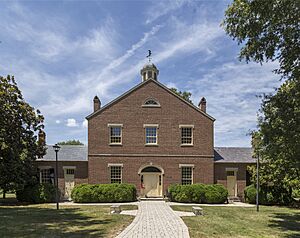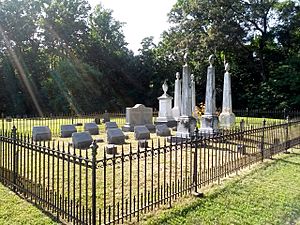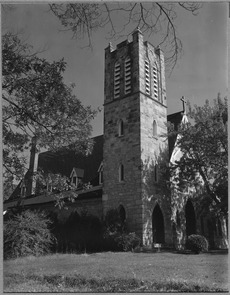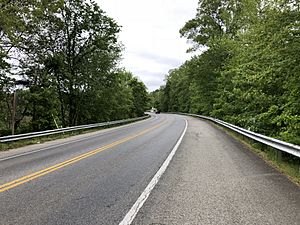Port Tobacco Village, Maryland facts for kids
Quick facts for kids
Port Tobacco Village, Maryland
|
|
|---|---|
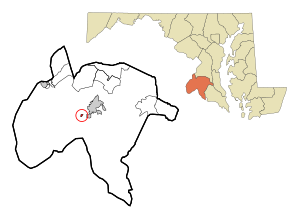 |
|
| Country | United States |
| State | Maryland |
| County | Charles |
| Settled | 1634 |
| Incorporated | 1888 |
| Area | |
| • Total | 0.18 sq mi (0.48 km2) |
| • Land | 0.18 sq mi (0.48 km2) |
| • Water | 0.00 sq mi (0.00 km2) |
| Elevation | 100 ft (30 m) |
| Population
(2020)
|
|
| • Total | 18 |
| • Density | 97.83/sq mi (37.68/km2) |
| Time zone | UTC-5 (Eastern (EST)) |
| • Summer (DST) | UTC-4 (EDT) |
| ZIP code |
20677
|
| Area code(s) | 240 and 301 |
| FIPS code | 24-63225 |
Port Tobacco Village is a small town in Charles County, Maryland, United States. In 2010, only 13 people lived there. This made Port Tobacco the smallest town in Maryland that is officially recognized as a town.
Contents
A Look at Port Tobacco's Past
Port Tobacco has a long and interesting history. Long ago, Algonquian-speaking people lived here. These included the Potapoco and the larger Piscataway tribe. English settlers arrived in the 1600s. The town was officially started in 1727.
Port Tobacco was once a very important place. It was the second-largest town in Maryland. It was also the first county seat for Charles County. This meant it was where the local government was located. The town was a busy seaport on the Port Tobacco River. Ships could travel from here to the Chesapeake Bay and the Atlantic Ocean.
However, the town started to decline. The river became too shallow for big ships because of siltation (when dirt and sand build up). Also, a railroad was built that bypassed the town. In 1888, Port Tobacco officially became a town. But in 1895, the county seat moved to La Plata. This caused many people to leave Port Tobacco. Even so, the town kept its important historical buildings.
Today, the old 1819 courthouse has been fixed up. It is now a historical museum. In 2007, a group started the Port Tobacco Archeology Project. They want to learn more about the history of Native Americans, European settlers, and Africans who lived here. Because of its unique past, the area is a very important place for archeological discoveries.
A few miles south, you can find the St. Ignatius Church. This church, its manor house, and cemetery are a National Historic Landmark. It was a Jesuit mission started in the 1600s. It is likely the oldest Roman Catholic church that has been open continuously since it was founded in the Thirteen Colonies. The church area has beautiful views of the Potomac River. John Hanson, who was a president of the U.S. Continental Congress, was born nearby.
Early History and Native Americans
For thousands of years, different groups of indigenous peoples lived along the waterways of Maryland. When Europeans first arrived, the Potapoco tribe lived along the Port Tobacco River. They spoke an Algonquian language and called their home Potapoco. The Piscataway tribe was the main tribe on the north side of the Potomac River. They later welcomed some smaller tribes into their group.
Colonial Times
English settlers arrived in Maryland. By 1634, they had built a small village on the east side of the Port Tobacco River. This village became a center for trade and government. It was first called Chandlers Town. It was one of the oldest English-speaking communities on the East Coast of the United States. In 1658, it became the first county seat of Charles County.
Later, the English changed the name to Port Tobacco. The name also referred to tobacco, which was the main crop grown and sold from the colony. The town grew because it was a major port for shipping tobacco. Large ships carried tobacco across the ocean. By the late 1600s, Port Tobacco was the second-largest river port in Maryland.
Early settlers in Port Tobacco had strong religious beliefs. These beliefs greatly influenced Maryland's history. There were both English Catholic and Church of England groups. A Jesuit priest named Father Andrew White started a mission in 1641. He later built a church at what is now St. Thomas Manor. This church, called St. Ignatius Church, was a center for Native Americans who became Christian. It is the oldest Catholic church in the United States that has been open continuously. It is now a National Historic Landmark.
In 1683, some settlers started their first Anglican group. This was after the Maryland Toleration Act of 1649, which allowed more religious freedom. The church, called Christ Church, grew strong. It was supported by a tax on tobacco. After the American Revolution, the church continued to thrive. A new brick church was built in 1827. Later, in 1884, a sandstone church was built. However, this church was moved to La Plata in 1904. Only the graveyard remains in Port Tobacco today.
Many important people lived in the Port Tobacco area. John Hanson was the first President of the Continental Congress under the Articles of Confederation. Daniel of St. Thomas Jenifer signed the United States Constitution. Thomas Stone was one of Maryland's signers of the Declaration of Independence.
Port Tobacco During the Civil War
During the Civil War, Port Tobacco was known for having many people who supported the Confederate side. However, Union troops occupied the town. Rose O'Neal Greenhow (1814–1864), who was born here, became a famous Confederate spy. She worked in Washington, DC. She sent military plans to the Confederates. Many believe her information helped them win the First Battle of Bull Run in July 1861.
Slaves in Maryland were freed on November 1, 1864. This happened when Maryland adopted a new Constitution. The Emancipation Proclamation of 1863 did not apply to states like Maryland that stayed in the Union.
After President Abraham Lincoln was assassinated, John Wilkes Booth was hunted. Information gathered in a Port Tobacco hotel helped find him. It showed that Booth had fled into Virginia. He was later found there.
Why the Town Declined
Port Tobacco began to decline for a few reasons. Too much farming and poor soil care caused a lot of siltation in the Port Tobacco River. This made the river too shallow for ships. Eventually, the town was cut off from the Chesapeake Bay and the Atlantic Ocean. Big trading ships could no longer use the port. So, business at the port decreased a lot by the time of the Civil War.
The decline got worse when a new Baltimore and Potomac Railroad line was finished in 1873. This railroad went to Pope's Creek, bypassing Port Tobacco. It went to another port directly on the Potomac River. In 1888, a small part of the town officially became Port Tobacco Village. This might have been an effort to save the town. But new communities grew along the railway and became successful. One of these was La Plata, which became the county seat in 1895.
Rebuilding and History Today
Today, the area is known as Port Tobacco Village. Because the town declined so quickly and the river filled with silt, many archeological sites were preserved. This makes it a very rich area for studying the history of Native Americans, colonial settlers, and enslaved Africans.
In 2007, the Port Tobacco Archeological Project began. It is a partnership of several groups. They encourage people from the community to help with the project. You can even volunteer to participate!
Visitors can see the rebuilt Port Tobacco Courthouse. It looks like it did in the 1800s. The North wing has exhibits about tobacco farming. It also shows archaeological finds that teach about early colonial and Native American life.
Other interesting historical places nearby include:
- Several 1700s homes listed on the National Register of Historic Places. These include Rose Hill, Ellerslie, Linden, Retreat, Stagg Hall, and Catslide House.
- The restored one-room schoolhouse, which was used from 1876 to 1953.
- Thomas Stone National Historic Site, which was the home of Thomas Stone. He was one of the 56 signers of the Declaration of Independence.
- St. Thomas Manor and Cemetery at Chapel Point. This is the oldest continuously operating Catholic church among the Thirteen Colonies. Exhibits here teach about early Catholic history and Jesuit missionary work. They also share Native American history.
- Mulberry Grove, the birthplace of John Hanson.
Port Tobacco Folklore: The Blue Dog Legend
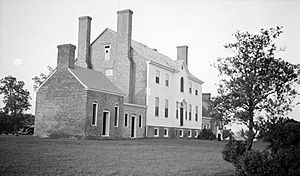
Around Halloween, people in Charles County remember the "Blue Dog" legend. This story has been told in the county for over 100 years. It is even taught in local schools! The legend says that the ghost of a large blue dog protects the treasure of his owner. The owner was murdered, and his treasure is supposedly buried somewhere along Rose Hill Road near Port Tobacco.
Charles Stuart, who owns the Rose Hill property, said the first written story of the Blue Dog legend was from 1897. Olivia Floyd, a famous Confederate spy and owner of Rose Hill, told the Port Tobacco Times that she had seen the ghost of the Blue Dog.
The legend says that in the 1700s, after the American Revolutionary War, a soldier named Charles Thomas Sims and his dog were killed. This happened on February 8 on Rose Hill Road. They were returning from a tavern in Port Tobacco. A man named Henry Hanos supposedly killed Sims and his dog to steal Sims' gold and a deed to an estate. Hanos buried the treasure under a holly tree along Rose Hill Road. But when Hanos came back for the treasure, the ghost of the Blue Dog scared him away. Hanos then got sick and died suddenly. To this day, the Blue Dog is said to watch over his master's treasure.
A filmmaker named Thuc Doan Nguyen is making a movie based on this tale.
Getting Around Port Tobacco
The main road that goes through Port Tobacco is Maryland Route 6. This road goes west to Nanjemoy. To the east, it connects with US 301 in La Plata.
Where is Port Tobacco?
Port Tobacco Village is in the middle of Charles County. It is near where Maryland Route 6 and Chapel Point Road meet. It is just southwest of the nearby town of La Plata. The town is located near the Port Tobacco River, which flows into the Potomac River a short distance south.
The United States Census Bureau says the town covers about 0.16 square miles (0.48 square kilometers) of land. There is no water area.
Population Changes Over Time
| Historical population | |||
|---|---|---|---|
| Census | Pop. | %± | |
| 1870 | 215 | — | |
| 1880 | 202 | −6.0% | |
| 1890 | 132 | −34.7% | |
| 1980 | 40 | — | |
| 1990 | 36 | −10.0% | |
| 2000 | 15 | −58.3% | |
| 2010 | 13 | −13.3% | |
| 2020 | 18 | 38.5% | |
| U.S. Decennial Census | |||
Who Lives in Port Tobacco?
In 2020, there were 18 people living in Port Tobacco Village. Most residents were White (72.22%). There was also a small percentage of Black or African American residents (5.56%) and people of mixed races (11.11%). About 11.11% of the population was Hispanic or Latino.
In 2010, there were 13 people living in the town. There were 7 households and 5 families. The average household had 1.86 people. The average family had 2.20 people.
The median age in the town was 64.5 years old. This means half the people were older than 64.5 and half were younger. Most residents were 65 years or older (46.2%).
Famous People from Port Tobacco
- George Atzerodt: He was involved with John Wilkes Booth in the plot to assassinate President Lincoln.
- Gustavus Richard Brown (1747–1804): A doctor who cared for George Washington when he was dying.
- Barnes Compton (1830–1889): A farmer, state lawmaker, and US congressman.
- John Hanson (1721–1783): The first President of the Continental Congress.
- Josiah Henson (1789–1883): An author, abolitionist, and minister. He was a former slave and inspired the book Uncle Tom's Cabin.
- Timmy Hill (1993–): A NASCAR race car driver.
- Tyler Hill (1994–): Also a NASCAR race car driver.
- Ann Teresa Mathews (1732–1800): She started the first Catholic convent in the United States.
- William Matthews (1770–1854): An early American Roman Catholic priest.
- Thuc Doan Nguyen (1976-): A writer.
- Daniel of St. Thomas Jenifer (1723–1790): He signed the United States Constitution.
- Charles H. Stonestreet (1813–1885): A Jesuit leader and president of Georgetown University.
Images for kids
See also
 In Spanish: Port Tobacco Village (Maryland) para niños
In Spanish: Port Tobacco Village (Maryland) para niños
 | Delilah Pierce |
 | Gordon Parks |
 | Augusta Savage |
 | Charles Ethan Porter |


